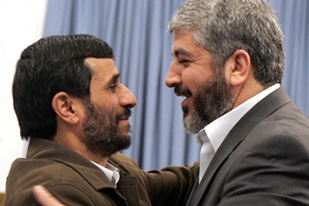UPDATES
Hamas versus Iran – Strange bedfellows falling out over Syria?
August 23, 2011 | Tzvi Fleischer

According to a potentially very significant news story, Hamas and its long-time key patron, Iran, have had a falling out over the unrest in Syria.
According to the report from Reuters:
Iran has cut back or even stopped its funding of Hamas after the Islamist movement, which rules the Gaza Strip, failed to show public support for Syrian President Bashar Assad, diplomats said on Sunday.
Hamas has denied that it is in financial crisis but says it faces liquidity problems stemming from inconsistent revenues from tax collection in the Gaza Strip and foreign aid.
The movement receives undisclosed sums of cash from Iran, which has acknowledged providing financial and political support to Hamas.
One diplomat, who asked not to be identified, said intelligence reports showed that Iran had reduced funding for Hamas.
Other diplomatic sources, also relying on intelligence assessments, said the payments had stopped over the past two months.
The diplomats cited Iran’s displeasure over Hamas’ refusal to hold rallies in support of Tehran’s ally, Assad, in Palestinian refugee camps in Syria after an uprising against his rule. Hamas’ leadership outside the Gaza Strip is headquartered in Damascus.
The truth is that while Hamas has long relied on Iran as a key supplier of funds, arms, training and diplomatic support, it has always been something of an odd fit and a marriage of convenience. While both are Islamist, Hamas is Sunni and a branch of the Muslim Brotherhood, the wellspring of most Islamist extremism in the Middle East since the 1920s, while the Iranian government follows a model of Shi’ite Islamic governance largely invented by Ayatollah Khomeini – rooted in the minority Shi’ite traditions of Islam, but also breaking from the dominant quietist view of most past Shi’ite religious thinkers. Sunni and Shi’ite fundamentalists don’t see eye to eye in many respects, and indeed, often despise each other, even if their interests overlap in terms of common hatred for Israel and the West, as well as opposition to most of the regimes of the Sunni Arab world.
Thus, while taking Iranian money, arms, training and other assistance, and prepared to serve Iranian tactical and political ends in return, Hamas was always careful not to give the Iranians too much influence on their strategy or ideology. (This contrasts sharply with Lebanon’s Hezbollah, which is essentially politically subservient to Teheran in almost all respects).
Now this marriage of convenience has apparently hit a major conflict of interest.
Despite Hamas having its headquarters in Damascus, and accepting large amounts of other assistance from the Syrian regime of Bashar al-Assad, the Muslim Brotherhood is against Assad, both because of the dominance in his government of the Alawite sect, viewed as heretical at best by Sunnis, and because the regime has violently suppressed the Syrian Brotherhood in the past. The Brotherhood hopes to use the Arab Spring to create Sunni Islamist regimes across the region, including in Syria, and gaining control of Damascus, viewed by many as the heart of the Arab world, would be a major achievement toward that end. Hamas largely shares this view.
But for Teheran, Assad is a long-standing and strategically essential ally, regardless of his regime’s religious character. Without Syria, Iran’s hope of dominating Lebanon through Hezbollah, and indeed, of creating a radical bloc with a hegemonic position across the Middle East, looks all but impossible.
Hamas has been keeping quiet about their falling out with Teheran, but the story makes it clear that financially, the movement is suffering from the cut-off of Iranian funds. It is reported that:
In a sign of a cash crunch, the Hamas government in Gaza has failed to pay the July salaries of its 40,000 employees in the civil service and security forces. Hamas leaders promised full payments in August, but not all employees received their wages as scheduled on Sunday.
In 2010, Hamas put its Gaza budget at $540 million, with local revenues from taxes on merchants and on goods brought in from Israel and through smuggling tunnels under the Egyptian border accounting for only $55 million.
The story does say that funds from the Egyptian Muslim Brotherhood, another major revenue source, also appear to have been cut back – the Egyptian Brotherhood doubtless needs the money to fund its aspirations for electoral success in Egypt.
While it is much too early to predict that the Hamas-Iran split will be permanent, if this did happen, it would be a major re-alignment of the Middle Eastern map, with important implications – particularly for Israel. Hamas would doubtless prefer to align with a Brotherhood-dominated Egypt, rather than Shi’ite Iran. If it did so, Israeli-Egyptian tension could be expected to become much more significant and continuous (this weekend’s public spat between Jerusalem and Cairo could be a small-scale preview of what is to come.) On the other hand, a Hamas not obliged to toe Teheran’s rejectionist line might be a bit more flexible in some respects.
At bottom, the reported Hamas-Teheran split appears to be yet another significant example of how much the Arab Spring is shaking up settled alignments and long-standing arrangements in the Middle East, with very uncertain medium and long-term implications.
Tzvi Fleischer
Tags: Egypt





